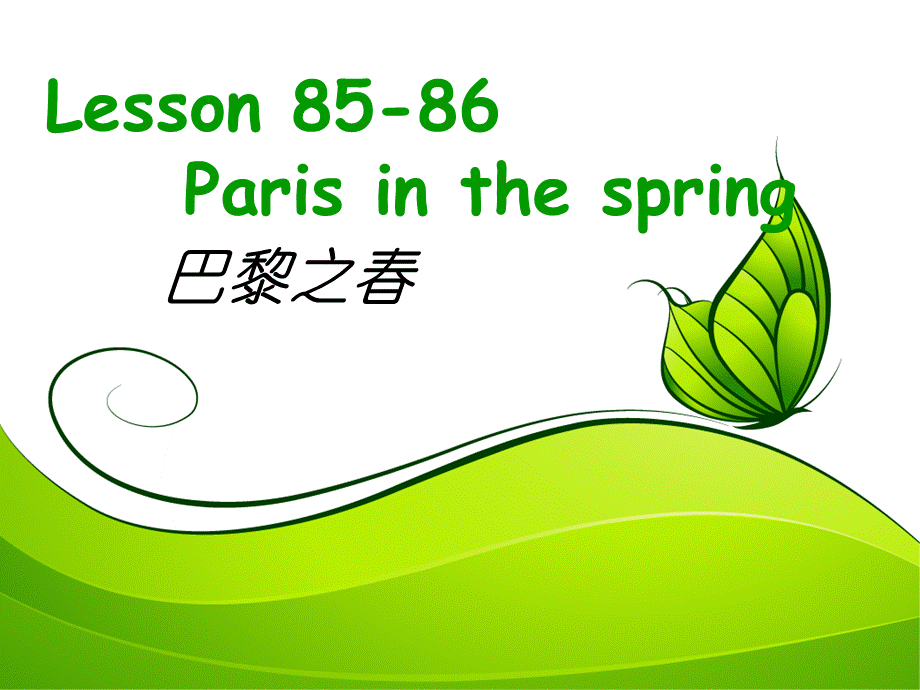新概念第一册85-86.ppt
《新概念第一册85-86.ppt》由会员分享,可在线阅读,更多相关《新概念第一册85-86.ppt(29页珍藏版)》请在冰豆网上搜索。

Lesson85-86Parisinthespring巴黎之春,DailyEnglish,Iambehindyou.我挺你!
Whatisthedistancebetweenthefirstletterandthelastletterof“smiles”?
此题答案是:
Onemile.问的是smiles这个单词中,第一个字母和最后一个字母之间的距离有多长,即除去第一个和最后一个字母s,剩下的是mile。
Whatofusgoesupandnevercomesdown?
Ourage,I.Revision:
TextinL83-84,CAROL:
Hello,Sam.Comein.TOM:
Hi,Sam.Werehavinglunch.Doyouwanttohavelunchwithus?
SAM:
No,thankyou.Tom.Ivealreadyhadlunch.Ihadathalfpasttwelve.CAROL:
Haveacupofcoffeethen.SAM:
Ivejusthadacup,thankyou.Ihadoneaftermylunch.TOM:
Letsgointothelivingroom,Carol.Wecanhaveourcoffeethere.,CAROL:
Excusethemess,Sam.Thisroomsveryuntidy.Werepackingoursuitcases.Weregoingtoleavetomorrow.TomandIaregoingtohaveaholiday.SAM:
Arentyoulucky!
TOM:
Whenareyougoingtohaveaholiday,Sam?
SAM:
Idontknow.Ivealreadyhadmyholidaythisyear.CAROL:
Wheredidyougo?
SAM:
Istayedathome!
I.Revision:
I.Revision:
GrammarpointsinL83-84,ThePresentPerfectTense(现在完成时)
(1)现在完成时表示过去发生或已经完成的动作对现在造成的影响或结果,也可表示过去已经开始,一直延续到现在的动作或状态。
(2)构成:
主语+have/has+过去分词+其他。
(当主语是第三人称单数时用has,其余人称用have。
过去分词:
规则动词的过去分词构成与动词过去式相同;不规则动词需要特殊记忆。
)否定式:
主语+havent/hasnt+过去分词+其他。
疑问式:
Have/Has+主语+过去分词+其他?
简略答语:
Yes,主语+have/has.(肯定)No,主语+havent/hasnt.(否定)(3)一般现在完成时通常与表示不确定的时间副词或短语连用如just,already,before,never,ever,twice,threetimes等。
(4)现在完成时在汉语中常用“了”、“过”或“已经”来表示。
I.Revision:
Nowletsdosomeexercises:
I.Fillintheblankswiththecorrectanswers:
()1._,Mum.Imlookingformytoycar.A.ExcusethemessformeB.ExcusemessC.ExcusemewiththemessD.Excusethemess()2.A:
Billy,goanddoyourhomework.B:
Oh,Mum.Ihave_finishedmyhomework.A.yetB.everC.alreadyD.never()3.I_aholidaynextmonth.A.amgoingtohaveB.havehadC.haveD.had()4.A:
Haveyou_yourlunch?
B:
Yes,I_itanhourago.A.have;hadB.had;haveC.had;hadD.have;have()5.A:
Didyoureadthebooklastnight?
B:
No,I_itthreetimes.A.havereadB.wasreadingC.havereadedD.readed,D,C,A,C,A,I.Revision:
Nowletsdosomeexercises:
II.Completethesentenceswiththewordsgiveninthecorrectform.1.ThisisthefirsttimeIhave_(be)inAustralia.2.Mybrother_(write)aletteratthemoment.3.Tom_(do)hishomeworkjustnow,butnowhe_(finish)already.4.Mayoften_(go)shoppingonFriday,butshe_(stay)athomelastFriday.5.Listen,someone_(knock)atthedoor.,been,iswriting,isknocking,goes,stayed,hasfinished,did,Lesson85ParisinthespringNewwordsandexpressions:
1.Paris/prs/n.巴黎2.cinema/snm/n.电影院3.film/flm/n.电影4.beautiful/bju:
tfl/adj.漂亮的5.city/st/n.城市6.never/nev/adv.从来没有7.ever/ev/adv.在任何时候,Lesson85ParisinthespringNewwordsandexpressions:
Paris/prs/n.巴黎ParisisthecapitalofFrance.Parisinthespring巴黎之春cinema/snm/n.电影院theatre剧院,戏院Wegotothe_toseeafilm.Wegotothe_toseeaplay.,cinema,theatre,Lesson85ParisinthespringNewwordsandexpressions:
filmn.
(1)(c)n.电影film艺术影片(英式英语)movie好莱坞商业片(美式英语)他拍了一部关于西班牙的电影。
HemadeafilmaboutSpain.makeafilmabout()(c)n.薄膜镜子蒙上了一层灰尘。
Themirroriscoveredwithafilmofdust.请把工装用薄膜盖上。
Pleasecoverthetoolingwiththefilm.(3)(u)n.胶卷,胶片arolloffilm,Lesson85ParisinthespringNewwordsandexpressions:
beautifuladj.漂亮的美丽的,使生美感的ShewasevenmorebeautifulthanIhadexpected.她甚至比我预期的还要美。
adj.出色的,完美的;令人愉悦的Hedidabeautifuljobofpaintingthedesk.他油漆了书桌,活干得很漂亮。
n.beautyn.美人,美景,美好的东西beautycontest选美adv.beautifullyeg.Shedances_(beautiful).,beautifully,Lesson85ParisinthespringNewwordsandexpressions:
nerver&ever,never决不,从不Iwillneverforgetyourkindness.我永远忘不了你的好意。
ever曾经,永远,究竟HaveyoueverbeentoParis?
你去过巴黎吗?
Couldweevergetpermission?
我们会被允许吗?
活到老,学到老。
Oneisnevertoooldtolearn.,Questions:
1.WhenwaskeninParis?
2.WhatwastheweatherlikeinParis?
3.WhenandhowdidGeorgeseethefilm?
HewasinParisinApril.,Theweatherwasawful.Itrainedallthetime.,Hesawthefilmontelevisionlastyear.,Pleaseenjoythevideoandthenanswerthequestionsontheright:
GEORGE:
Hello,Ken.KEN:
Hi,George.GEORGE:
Haveyoujustbeentothecinema?
KEN:
Yes,Ihave.,have/hasbeento去过已回have/hasgoneto去了未回,just刚刚,刚才,Haveyoujustbeentothecinema?
你刚刚去过电影院吗?
这是一个现在完成时态的一般疑问句。
just:
刚刚,刚才,现在完成时态的标志词之一,把这句话变为肯定句:
Ihavejustbeentothecinema.我刚刚去了电影院。
仿照例句:
我刚刚去了图书馆。
Ivejustbeentothelibrary.,havebeento与havegoneto的区别:
havebeento表示曾经去过某地,已经回来了;havegoneto表示去了某地,还没有回来(可能在路上,可能还在那里);如:
MyfatherhasbeentoBeijingmanytimes.Myfatherisntin.HehasgonetoBeijing.,我父亲去过北京许多次了。
(画外音:
已经从北京回来了。
),我父亲不在,他去北京了。
(画外音:
他还在北京,没有回来。
),GEORGE:
Whatson?
KEN:
Parisinthespring.GEORGE:
Oh,Ivealreadyseenit.Isawitontelevisionlastyear.Itsanoldfilm,butitsverygood.,beon是上演的意思,也可理解成在荧幕上,inspring/summer/autumn/winter在季节前不用加任何冠词Parisinthespring本课是特指巴黎的一个春天,所以加了定冠词the。
Whatson?
这里的beon是“上演”的意思,有一个新电影正上演。
Anewfilmisnowon.,今天晚上电视上有什么节目?
Whatsontelevisiontonight?
Ivealreadyseenit.我已经看过了。
Isawitontelevisionlastyear.我是去年在电视上看的。
Itsanoldfilm,butitsgood.这是部老片子,但很好。
仿照例句:
我已经读了这本书。
我是在昨天读的。
这是本旧书,